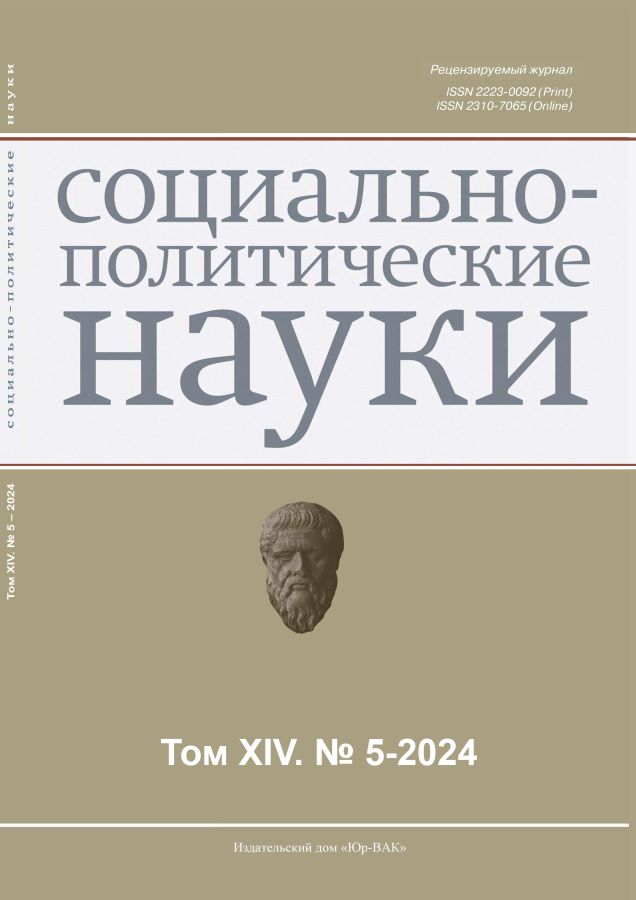К вопросу разработки технологии оценки эффективности инструментов формирования доверия в современном обществе
- Авторы: Каменева Т.Н.1, Тюриков А.Г.1, Сотников В.А.2, Орлова Е.М.3
-
Учреждения:
- Финансовый университет при Правительстве Российской Федерации
- Российский национальный исследовательский медицинский университет им. Н.И. Пирогова Министерства здравоохранения Российской Федерации
- Курская академия государственной и муниципальной службы
- Выпуск: Том 14, № 5 (2024)
- Страницы: 160-166
- Раздел: Социология управления
- URL: https://journals.eco-vector.com/2223-0092/article/view/655532
- DOI: https://doi.org/10.33693/2223-0092-2024-14-5-160-166
- EDN: https://elibrary.ru/SGAXFM
- ID: 655532
Цитировать
Полный текст
Аннотация
В представленной статье проанализирован вопрос, связанный с проблематикой оценки эффективности инструментов формирования доверия в современном нестабильном и нелинейном российском обществе. Методологическую базу исследования составили подходы к доверию Г. Зиммеля, Дж. Коулмана, Р. Хардина. В эмпирическую основу положены результаты социологических исследований, проведенных с участием автором в 2023 и 2024 гг. В статье обосновано, что формирование доверия, культуры доверия является важной задачей, стоящей перед российским обществом. Результаты проводимых социологических исследований показывают повышение уровня доверия населения в целом, в том числе и в молодежной среде. В тоже время положительные тенденции роста доверия в большей степени затрагивают институциональный уровень нежели индивидуальный. Существующие инструменты формирования доверия достаточно гибридны и их эффективность неочевидна. В этой связи становится очевидной задача вычленения эффективных инструментов формирования доверия и определение тех, чья эффективность неоднозначная. Для определения эффективности имеющихся инструментов формирования доверия необходимо использовать определенный, четкий алгоритм действия с конкретными методами, и процедурами. В качестве такого алгоритма может быть предложена универсальная технология оценки эффективности инструментов формирования доверия. Технология предполагает оценку инструментов институционального и индивидуального уровня и основана на принципах системности и целостного подхода, учета рисков, институциональности, инновационности и технологичности, комплементарности, полисубъектности, преемственности, адаптивности, конкурентности. Этапами реализации технологии оценки инструментов формирования доверия в современном обществе могут быть анализ ситуации, прогнозирование, отбор вариантов критериев и показателей оценки.
Ключевые слова
Полный текст
Об авторах
Татьяна Николаевна Каменева
Финансовый университет при Правительстве Российской Федерации
Автор, ответственный за переписку.
Email: kalibri0304@yandex.ru
ORCID iD: 0000-0002-0250-2421
доктор социологических наук, доцент, профессор, кафедра социологии, факультет социальных наук и массовых коммуникаций, главный научный сотрудник, Институт гуманитарных технологий и социального инжиниринга
Россия, г. МоскваАлександр Георгиевич Тюриков
Финансовый университет при Правительстве Российской Федерации
Email: AGTyurikov@fa.ru
ORCID iD: 0000-0001-8388-9543
доктор социологических наук, заведующий, кафедра социологии, главный научный сотрудник, Институт гуманитарных технологий и социального инжиниринга
Россия, г. МоскваВладислав Андреевич Сотников
Российский национальный исследовательский медицинский университет им. Н.И. Пирогова Министерства здравоохранения Российской Федерации
Email: sotnikov_va@rsmu.ru
ORCID iD: 0000-0001-5081-6153
кандидат психологических наук, заведующий, кафедра общей психологии и психологии развития, Институт клинической психологии и социальной работы
Россия, г. МоскваЕлена Михайловна Орлова
Курская академия государственной и муниципальной службы
Email: family.orlova@yandex.ru
ORCID iD: 0009-0001-0319-7668
SPIN-код: 6034-1643
кандидат философских наук, доцент, кафедра государственного, муниципального управления и права
Россия, г. КурскСписок литературы
- Sztompka P. Trust: A sociological theory. Cambridge: Cambridge University Press, 1999. Pp. 65–68.
- Фреик Н.В., Штомпка П. Доверие: социологическая теория // Социологическое обозрение. 2002. № 3.
- Зборовский Г.Е. Понятие и структура доверия в высшем образовании // Вестник Сургутского государственного педагогического университета. 2018. № 2 (53).
- Левада Ю. Механизмы и функции общественного доверия // Мониторинг. 2001. № 3.
- Карпичев В. Доверие как социальный механизм стабилизации общества и государства // Государственная служба. 2015. № 4 (96).
- Aнтоненко И.В. Доверие как интеграционный механизм общества // Педагогика и психология современного образования: теория и практика: матер. науч.-практ. конф. (Ярославль, 5–6 марта 2020 г.). Ярославль: Ярославский гос. пед. ун-т им. К.Д. Ушинского, 2020. Ч. 2. С. 227–233. EDN: OZWXEP.
- Helliwell J.F., Huang H., Wang S. New evidence on trust and well-being // The Oxford Handbook of Social and Political Trust. 2017. W22450. Pp. 409–446. doi: 10.1093/oxfordhb/9780190274801.013.9.
- Акимова А.Ю. и др. Доверие и недоверие в условиях развития гражданского общества / отв. ред. А.Б. Купрейченко, И.В. Мерсияновой. М.: Издат. дом НИУ ВШЭ, 2013. 564 с. ISBN: 978-5-7598-1140-4.
- Justwan F., Bakker R., Berejikian J.D. Measuring social trust and trusting the measure // Social Science Journal. 2018. No. 55 (2). Pp. 149–159. doi: 10.1016/j.soscij.2017.10.001.
- Мерзликин Н.В. Граждане и эксперты о доверии институтам и политике российского государства // Наука. Культура. Общество. 2024. Т. 30. № 1. С. 22–34. doi: 10.19181/nko.2024.30.1.2. EDN: ZRAWXD.
- Глушко И.В. Социальное доверие: концепт и структура // Философия права. 2013. № 6 (61).
- Фетюков А.В. Доверие и его роль в установках экономического поведения населения (на данных Вологодской области) // Социальное пространство. 2022. Т. 8. № 3. doi: 10.15838/sa.2022.3.35.9.
- Трындина Н.С. Анализ подходов к оценке уровня доверия // Вестник Воронежского государственного университета. Серия: Экономика и управление. 2023. № 1. С. 20–34. doi: 10.17308/econ.2023.1/10962.
- Трындина Н.С., Устюжанина Е.В. Доверие как экономическая категория: подходы к классификации и систематизации // Креативная экономика. 2023. Т. 17. № 1. С. 39–54. doi: 10.18334/ce.17.1.116590. EDN: FHODGJ.
- Algan Y., Cahuc P. Trust, growth, and well-being: New evidence and policy implications // Handbook of Economic Growth. 2014. No. 2 (7464). Pp. 49–120. doi: 10.1016/B978-0-444-53538-2.00002-2.
- Каз Е.М. Доверие в организации и результативность деятельности: от модели к инструментам // Вестник Томского гос. ун-та. Экономика. 2021. № 53.
- Цепелева Н.П. Этическое (само)регулирование в сфере государственной и муниципальной службы: проблема доверия // Контекст и рефлексия: философия о мире и человеке. 2021. Т. 10. № 4A. С. 109–119. doi: 10.34670/AR.2021.75.15.012. EDN: OWWBUP.
- Simmel G. The philosophy of money. London: Routledge, 2004. 538 p.
- Simmel G. The sociology of Georg Simmel. N.Y.: Free Press, 1950. 445 p.
- Coleman J.S. Foundations of social theory. Cambridge, MA: Belknap, 1990. 993 p.
- Hardin R. Trust and trustworthiness. N.Y.: Russel Sage Foundation, 2002. 234 p.
Дополнительные файлы









